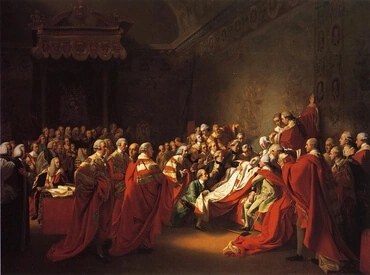1
And when Saul's son heard that Abner was dead in Hebron, his hands were enfeebled, and all Israel was troubled.
2
And Saul's son had two men, captains of bands: the name of the one was Baanah, and the name of the other Rechab, the sons of Rimmon the Beerothite, of the children of Benjamin; for Beeroth also was reckoned to Benjamin.
3
And the Beerothites had fled to Gittaim, and were sojourners there until this day.
4
And Jonathan Saul's son had a son that was lame of [his] feet. He was five years old when the news came of Saul and Jonathan out of Jizreel; and his nurse took him up and fled. And it came to pass, as she made haste to flee, that he fell, and became lame. And his name was Mephibosheth.
5
And the sons of Rimmon the Beerothite, Rechab and Baanah, went and came in about the heat of the day into the house of Ishbosheth, who was taking his noonday rest.
6
And they came thither into the midst of the house, [as though] they would fetch wheat; and they smote him in the belly; and Rechab and Baanah his brother escaped.
7
They came into the house, as he lay on his bed in his bedchamber, and they smote him, and slew him, and beheaded him; and they took his head, and went by the way of the plain all night.
8
And they brought the head of Ishbosheth to David in Hebron, and said to the king, Behold the head of Ishbosheth the son of Saul, thine enemy who sought thy life; and Jehovah has given to my lord the king to be avenged this day of Saul and of his seed.
9
Then David answered Rechab and Baanah his brother, the sons of Rimmon the Beerothite, and said to them, [As] Jehovah liveth, who has redeemed my soul out of all distress,
10
when one told me, saying, Behold, Saul is dead! and he was in his own sight a messenger of good, I took hold of him, and slew him in Ziklag -- to whom forsooth I should give a reward for his good tidings:
11
how much more, when wicked men have slain a righteous person in his own house upon his bed? and should I not now demand his blood of your hand, and take you away from the earth?
12
And David commanded his young men, and they slew them, and cut off their hands and their feet, and hanged [them] up over the pool in Hebron. But they took the head of Ishbosheth, and buried it in the sepulchre of Abner in Hebron.







